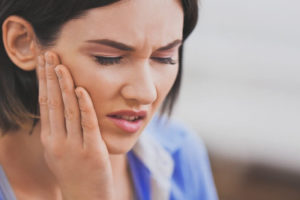TMJ

Have questions about TMJ disorder and how to know if you may have it? Our dentists took some time to share information and answer common patient questions to help educate about your TMJ and how TMJ disorder can affect your oral health. View the table of contents below to learn more or find your question and get an answer from one of our dentists!

The following content was provided by Dr. Michael DesRosiers, LVIF Certified General Dentist, and has been medically reviewed for accuracy. Some relevant links have been added to audio transcripts to provide resources for additional information.
Table of Contents:
Click a question below to be taken directly to that answer.
What does TMJ stand for?
Answer provided by Dr. Michael DesRosiers. Transcript included below.
Dr. Michael DesRosiers:
TMJ stands for temporomandibular joints. So that is the actual anatomical name for the joint that operates your lower jaw. That term gets tossed around a lot to describe a problem, which is really more appropriately collectively called TMD, temporomandibular dysfunction, which are problems with that joint and the associated muscles and system.
What are the symptoms of TMJ disorder?
Answer provided by Dr. Michael DesRosiers. Transcript included below.
Dr. Michael DesRosiers:
The symptoms of TMJ are just so varied, and really, you can have all of them, you can have one, you can have a couple. But largely, the symptoms that are most commonly tied to that are this. Popping and clicking in the jaw or locking of the jaw. And when you open and close your mouth, sometimes you’ll feel or hear, or both, a popping and clicking sound right in front of your ear. That would be a good indication that you really need to get that looked at.
So many times, if we don’t have pain with things like that, we tend to let them go. But really, we should jump on that more quickly. It shouldn’t be doing that. So it can be corrected a lot of times at that point, and if it’s not, it can lead to bigger problems and symptoms down the road.
Other symptoms include migraine-type headaches, ear pain and congestion, neck and shoulder pain, tingling in the fingertips or hands. There’s just a lot of things that you wouldn’t normally think might be connected to your jaw joint that really, once you get it functioning correctly, we can alleviate a lot of those symptoms.
How do you treat TMJ pain?
Answer provided by Dr. Michael DesRosiers. Transcript included below.
Dr. Michael DesRosiers:
So there are different ways to treat it. We have to do a really thorough exam, determine what the problem is. Most times, there is some deficiency in the bite, in the way that the lower jaw articulates with the upper jaw. And so, the initial treatment is to set that in the right position, find the good, comfortable muscular position, construct an appliance called an orthotic that will help to guide your teeth into that position when you bite. And, if necessary, that can be permanently fixed, either restoratively or with orthodontics.
What is TMJ?
Answer provided by Dr. Michael DesRosiers. Transcript included below.
Dr. DesRosiers:
TMJ is an acronym that’s assigned to the actual joint itself, the temporomandibular joint. When people talk about TMJ, they’re really, in most cases, talking about TMD, which are the very, very wide range of symptoms that are associated with problems associated with the TMJ. One of the most common problems that people will have is popping and clicking in their joint, where they open and close and their jaw will pop kind of right in front of their ear. You’ll feel, or hear, or both a popping or clicking noise. Sometimes that graduates to the point where someone’s jaw will lock either open or closed. They can’t get their teeth apart or together, or they just notice a change in their ability to open wide or painful closing.
Some people never have that problem at all, but they have other problems that are associated with the position of the lower jaw, such as migraine headaches, pain in their neck and shoulders, ringing in their ears, tingling in their fingertips. There’s just so many things that are associated with it. It’s often called the great imposter, TMD, because it mimics so many different things. For instance, with the ear symptoms, we have a lot of people that will go and see an ENT doctor, because their ear hurts, which seems like a sensible thing to do. It is, but when they get there, they look in their ear and everything looks fine, because the problem isn’t coming from within their ear. It’s radiating from pain from the joint.
What does TMJ pain feel like?
Answer provided by Dr. Michael DesRosiers. Transcript included below.
Dr. DesRosiers:
TMJ pain can feel a lot different, depending on what exactly is going on with the patients. Sometimes it hurts right exactly where the joint is or just a little bit behind it. That would equate to sort of right in front of your ear a really sore pain, shooting pain. Sometimes it’s more diffuse kind of headaches in the temple area, headaches in the very back of the head. It can be neck pain, shoulder pain. It’s just a whole host of different kinds of symptoms. It just really varies from person to person, but those are some of the most common.
What happens if TMJ is left untreated?
Answer provided by Dr. Michael DesRosiers. Transcript included below.
Dr. DesRosiers:
The trouble with leaving TMJ untreated is that the symptoms typically will progress. It won’t just stay in a kind of a stasis, where it’s getting no better or worse. A lot of times when people have popping and clicking and they say, “Well, my jaw used to pop and click, and now it stopped,” that’s typically not a good thing if it happens on its own. What happens most times is you’re replacing and displacing the disc in your joint. That’s what the popping and clicking is. When it stops, it’s usually stops because it’s no longer being replaced or can’t be held in position. It’s not popping when you open, because it can no longer pop back into place, so it’s staying out of place all the time. We get somewhat accommodated to that.
What typically happens later on in life is that that causes a misalignment, which causes a whole host of other problems, headaches, migraine headaches, neck pain, shoulder pain, eye pain, ear pain, a lot of different things. Sometimes it doesn’t get addressed until those things get bad enough where it really affects the way that you’ll live and they can’t take it anymore permanently.
Can you cure TMJ permanently?
Answer provided by Dr. Michael DesRosiers. Transcript included below.
Dr. DesRosiers:
You can cure TMJ permanently in most cases. What we do is we stabilize the position of the disc and the joint and also make sure that the muscles and the bite position are in a comfortable position. We do that using some sophisticated computer system that we have, electromyography, to make sure the muscles are in a comfortable position. We also use jaw tracking to make sure that your jaw has a good kind of path of opening and closure, that when you close together your muscles are in a good, comfortable position. Your joint doesn’t have any dysfunction when you’re, when you’re kind of going through the methods of chewing and things like that.
Once we establish that, we typically will have the patient in a device called an orthotic for a while. We make an orthotics that accomplishes all of these things. We make sure that the bite is solid, the symptoms are gone, and you can function, eat, sleep, do all of these things in that healthy position and get rid of the symptoms. After we’re sure of that, there are ways to permanently solidify the patient in that position, establish that as the new bite, It can be done in some cases orthodontically. Sometimes for those patients we actually restore their teeth in that position, so actually we prepare crowns on all the teeth to establish that new bite. It’s cosmetically fantastic. The patients feel better than they probably ever have. Those are just really, really nice and rewarding cases to do.
What kind of doctor do you see for TMJ pain?
Answer provided by Dr. Michael DesRosiers. Transcript included below.
Dr. DesRosiers:
There are several different doctors that will treat different facets of TMJ. Sometimes it’s kind of a concerted effort between a couple of different professionals. The very first place I would start is to see your dentist and have them evaluate. Do You think that you have TMJ? Certainly mention it. Mention the symptoms that you’re having. Have them check it. Some dentists are more educated in that and have more experience with it, as far as actually treating it, but all dentists should be able to screen for it. We certainly see a lot of TMJ patients. In many cases, I’ll work side by side with a physical therapist or a chiropractor to get rid of all the symptoms. We get the bite in a good place, but sometimes we need to establish a healthy alignment in the neck or upper back to kind of help us make sure that we’re in the right spot and we have the patient doing their absolute best.

